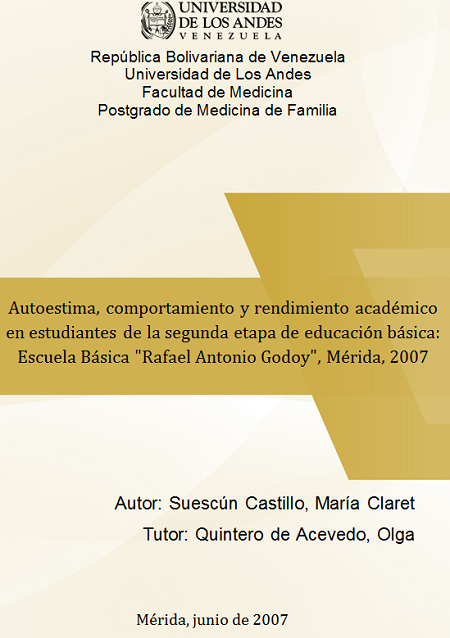Autoestima, comportamiento y rendimiento académico en estudiantes de la segunda etapa de educación básica : Escuela Básica "Rafael Antonio Godoy"
Fecha
2007-11-16Autor
Suescún Castillo, María Claret
Metadatos
Mostrar el registro completo del ítemResumen
Objetivo: Determinar la autoestima y el comportamiento (asertivo, pasivo,
agresivo), en los estudiantes de la segunda etapa de educación básica de la
Unidad Educativa "Rafael Antonio Godoy" y su relación con el rendimiento
académico. Metodología: se realizó un estudio descriptivo y correlacional, de
corte transversal, en 160 estudiantes cursantes del cuarto, quinto y sexto grado.
La recolección de los datos se realizó a través de la aplicación de dos
instrumentos: Test de Aysén (Autoestima) y la Escala de Comportamiento Asertivo
(CASS). Resultados: el promedio de edad fue de 10 años, con predominio del
sexo masculino (54,37%). El 49,36% cursaban el cuarto grado. El 63,80% de los
encuestados tienen autoestima alta (71-90 puntos) y el 87,50% tienen
comportamientos asertivos. Un 33,13% aprobó al grado superior con el literal B y
un 28,75% con C considerado (bajo rendimiento). No se encontró relación
estadísticamente significativa entre autoestima, comportamiento asertivo, sexo,
grado cursado y rendimiento académico, pero si hubo relación significativa entre
rendimiento académico excelente-bueno (A y B) con comportamiento asertivo y
bajo rendimiento (C) con comportamiento pasivo. Conclusiones: los resultados
de la presente investigación nos permiten afirmar la relación que existe entre los
tipos de comportamiento y el rendimiento académico, mas no así la autoestima;
variables que pueden ser consideradas como factores protectores. Determine self esteem and behavior (assertive, passive, agressive) in
students of the second stage of basic education of the Unity of Education ¡'Rafael
Antonio Godoy" and their relation with academic performance. Methodology: A
descriptive and analogous, of a transversal cut, study was carried out, in 160
students of fourth, fifth and sixth grade was carried out. Data gathering was
carried out through the application of two instruments: Aysen Test (Self Esteem)
and the Scale of Assertive Behavior (SAB). Results: The average age was of 10
years, and the male sex (54.37%) prevailed. A 49.36% were studying the fourth
grade. A 63.80% of the persons surveyed have high self esteem (71-90 points)
and an 87.50% have assertive behavior. A 33.13% approved the superior grade
with a literal B and a 28.75% with C considered (Iow performance). No significant
statistical relation was found among self esteem, assertive behavior, sex, grade
taken and academic performance but there was a significant relation between
excellent-good academic performance (A and B) and assertive behavior and low
performance (C) with passive behavior. Conclusions: The results of this
research allow us to affirm the relation existing between the types of behavior
and academic performance, but no so self esteem, variables that may be
considered as protection factors.

